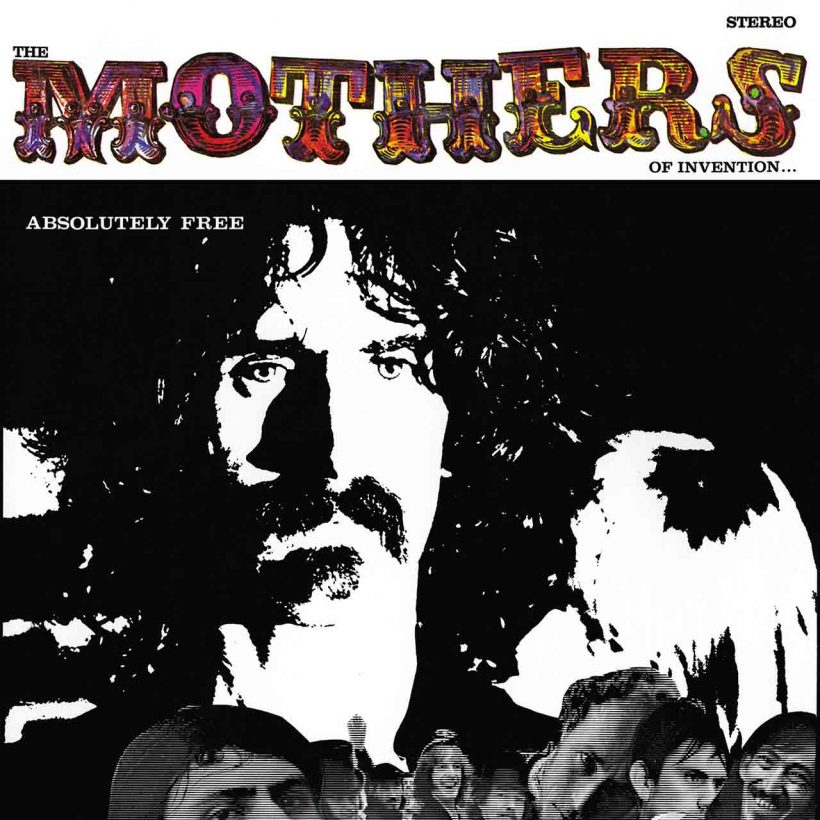‘Absolutely Free’: Frank Zappa And The Mothers Of Invention’s Early Classic
Frank Zappa’s second album saw him take aim at society while producing ever-more ambitious music.

Nobody could accuse Frank Zappa of lacking ambition. His first album with The Mothers Of Invention, 1966’s Freak Out!, was a sprawling double that took aim at the ills of modern US society as Zappa perceived them – consumerism, racism, censorship, you name it – and set his thoughts to a cutting-edge and mischievous mix of rock, blues, modern classical, doo-wop, and avant-garde sounds.
For his next trick – the following year’s Absolutely Free – Zappa upped the ante. The composer conceived of the album as two long pieces, one on each side of the original vinyl release. Zappa took inspiration from opera. Interviewed by Don Paulsen in December 1966, Zappa revealed that his upcoming work would be “rock’n’roll music… but it’s an oratorio… What it is is maybe eight songs that are edited together – wham! – like that, like one continuous piece of music… a panorama of American life today.”
Listen to Frank Zappa And The Mothers Of Invention’s Absolutely Free now.
Traditionally, oratorios are of a religious and devotional nature. Zappa’s devilish twist was to double down on the criticisms of American life he aired on Freak Out! The lyrics of Absolutely Free were grittier, weirder, and more outspoken than his debut. Zappa was railing against every aspect of society. “My theory is that, in America, they purposely avoid teaching you to evaluate… They don’t want everybody evaluating every piece of the world they live in,” said Zappa in a 1967 Melody Maker interview. “The whole machinery in the States would collapse because everybody would suss the rotten society they are forced to live in and will continue to live in unless they get up and start changing things.”
The passivity of the American public was a favorite theme of Zappa’s on Absolutely Free. The cartoonish psych-rock of “Call Any Vegetable” carried a serious message, as Zappa told Barry Miles of The International Times: “People who are inactive in a society… people who do not live up to their responsibilities are vegetables. I feel that these people, even if they are inactive, apathetic, or unconcerned at this point, can be motivated toward a more useful sort of existence. I believe that if you call any vegetable, then it will respond to you.”
Zappa’s ire wasn’t just aimed at the Average Joe. Despite being hailed as a voice of the counterculture, Zappa had few kind words for hippies on “Plastic People.” The song referenced riots that took place in Los Angeles in late 1966, in which roughly 1,000 demonstrators protested on the Sunset Strip after a period of enforced curfews, mass arrests, and raids on hip music clubs. Police misjudged the situation, things turned nasty, and over 300 tie-dyed protestors found themselves in the West Hollywood sheriff station. Buffalo Springfield’s Steven Stills witnessed the scenes firsthand and wrote “For What It’s Worth,” an era-defining call for compassion and understanding. Zappa’s “Plastic People” demonized the police, but also criticized the protestors for allowing themselves to be manipulated by those in charge in the first place.
Still, Zappa reserved his most scathing lyrics for “the men who make your laws.” “Brown Shoes Don’t Make It” pointed the finger at government corruption, with the character City Hall Fred embodying all that is sleazy and perverted. Zappa’s unflinching description of Fred’s activities might be uncomfortable, but the listener is in no doubt as to the morals of the character. Zappa spoke about it with The International Times: “‘Brown Shoes Don’t Make It’ is a song about the people who run the government, the people who make the laws that keep you from living the kind of life you know you should lead. These unfortunate people manufacture inequitable laws and ordinances, perhaps unaware of the fact that the restrictions they place on the young people in a society are a result of their own hidden sexual frustrations. Dirty old men have no business running your country.”
“Brown Shoes Don’t Make It” also emphasizes Zappa’s rapid evolution as a composer and arranger. It’s an extraordinary piece of music, hurtling through 22 distinct sections in seven-and-a-half minutes with astonishing dexterity. Bluesy psychedelia, Sprechstimme, foley sound making, chamber music, garage rock, classical, music hall, a Beach Boys homage, doo-wop… it’s all there, and more, before Zappa brings the curtain down with a riveting and chaotic orchestral section. It truly showed the extent of what the composer was capable of.
Absolutely Free still stands up as a thrilling and audacious statement, featuring some of Zappa’s best early work. Of course, he was only just getting started…
Listen to Frank Zappa And The Mothers Of Invention’s Absolutely Free now.












